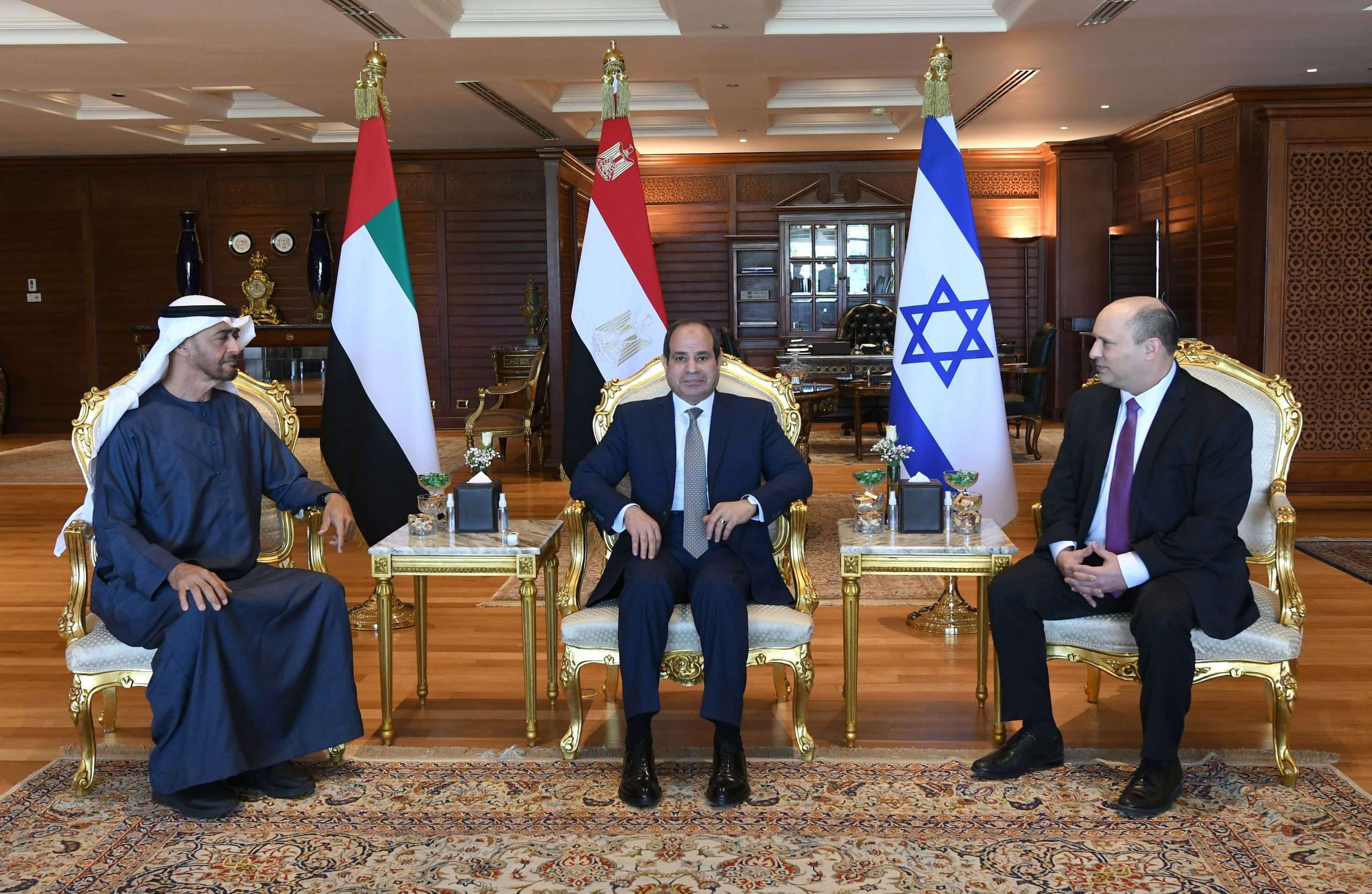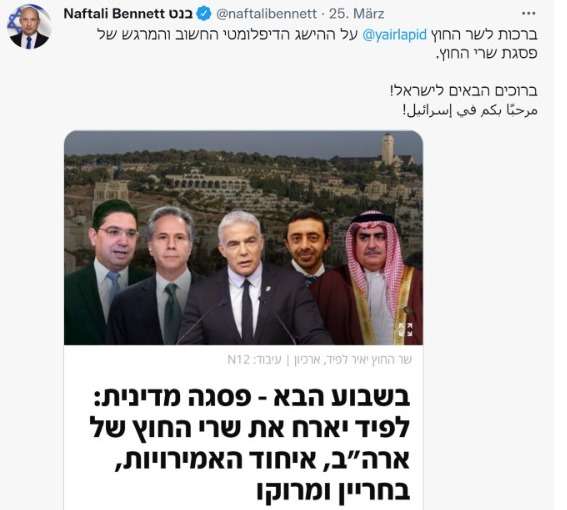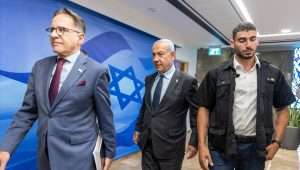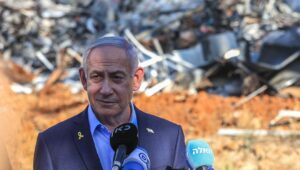A historic summit is taking place in Israel today and tomorrow. The Arab foreign ministers from Egypt, Morocco, Bahrain and the United Arab Emirates will form a common front with the Israeli government against the Iranian nuclear threat a few days before the Muslim holy month of Ramadan. US Secretary of State Anthony Blinken will also be here for the meeting. It is still unclear whether the Jordanian foreign minister will likewise attend. Iran’s nuclear program poses a far greater threat to Sunni governments in the Middle East than many realize, which is why these countries are joining Israel in opposing negotiations on the old/new nuclear deal in Vienna. Irrespective of this, the Jordanian king is also planning a visit to Palestinian leader Mahmoud Abbas in Ramallah in the coming week.
בהצלחה לקראת פסגת הנגב עם שרי החוץ של האזור ומזכיר המדינה האמריקאי.
יישר כוח ל@yairlapidבונים גשרים! pic.twitter.com/BJoR5cJsJY
— Naftali Bennett בנט (@naftalibennett) March 26, 2022
The summit will take place in Israel’s southern desert, in Sde Boker, the kibbutz where Israel’s first prime minister, David Ben-Gurion, once lived. “Anyone who doesn’t believe in miracles isn’t a realist,” he said at the time, and today a miracle happens. The Arab governments want to enter into a strategic alliance with the government in Zion against Persia. This is what will be presented today to America’s top diplomat. In addition, the summit in the Negev signals to the Bedouins that the desert belongs to Israel.
If the discussions are positive, the Hashemite Kingdom east of the Jordan will also send its foreign minister to Israel. It is only 30 minutes by helicopter.
The summit in the Negev comes just days after a meeting in Sinai between Israel Prime Minister Naftali Bennett, Egyptian President Abdel-Fattah El-Sisi and UAE Crown Prince Abdullah bin Zayed Al Nahyan.

Little information has leaked out from the tripartite summit in Sinai, but what we do know is that an alliance is forming among Middle East countries that feel betrayed by the new US administration under Joe Biden, and that includes Israel . An alliance that essentially focuses on security, but also accelerates economic cooperation between countries and develops it into a real union. Behind the scenes, Saudi Arabia is also involved, but since Riyadh and Jerusalem have not yet signed an official agreement, a Saudi foreign minister cannot be seen in the photo.

What we are witnessing is actually what Israel was promised with the Oslo Accords some 30 years ago: the vision of a “New Middle East.” But that vision has shattered before the eyes of Israel and the Palestinians, and in that time has only produced more bloodshed. In contrast to the earlier visions and empty promises, a real vision in the Middle East is now emerging, based on two emerging pillars:
- A common nuclear threat; and
- Recognition that Israel is a superpower in the Middle East.
These are the elements that have warmed diplomatic relations between the Jewish State of Israel and the Sunni governments in the region. And the Palestinians don’t seem to be invited because they’re still standing firm on the notion that regional stability and peace depends on resolving the Israeli-Palestinian conflict. They insisted that as long as that conflict remained unresolved, no Arab country would want to make peace with Israel. But that was dead wrong, and Israel and the Middle East owe that in part to former Israel Prime Minister Benjamin Netanyahu.
At the time of Oslo, then-Foreign Minister Shimon Peres had a vision of a New Middle East. He painted a picture of a Middle East without war, full of harmony, happiness and prosperity. However, his idea was based on false assumptions. He believed that peace and tranquility would take the place of power and territory. For this Israel would have to capitulate to the Palestinians and solve the Palestinian problem. But that didn’t work. Of course, the Palestinians will never admit this and therefore remain almost silent on the Arab summit in Zion. They don’t play along and that makes everyone else upset with them. And yet the conflict with the Palestinians will be discussed in connection with the upcoming Ramadan holiday. Escalation must be prevented at all costs.
As it stands today, the Arab governments want a strong Israel. A strong Israel to protect them after the American and European betrayals and stand by them in the face of the Iranian nuclear threat. Arab governments in the Middle East now have more faith in Israel than in American and European governments.
A key item on the agenda of the upcoming talks is a defense alliance between Jerusalem and Arab countries against Iranian missiles. According to various sources in Jerusalem, Bennett has been pushing our neighbors to do this for several months. There is talk of a regional strategy according to which Israeli defense systems could also be stationed in Arab countries in the vicinity of Iran to protect all allies from the Iranian missile threat. If you want, you can see this as a kind of “NATO” of the Sunni countries and the Jewish state against Iran. And it’s all happening quite opposite to the impossible ideas sold to us by the Palestinians and Shimon Peres in the 1990s.
This has a lot to do also with the machinations of Washington and the West. The three statesmen who gathered in Sinai this week see themselves and their nations as abandoned by Western governments eager to please the ayatollahs in Tehran in order to restart billions of dollars in trade.
The Arab governments and the government of Zion are disappointed in the Biden Administration and understand that they can only rely on themselves and their new alliance. The Russian invasion of Ukraine made that clear. All it takes is one player losing his head and attacking. A strategic alliance must be ready to handle such a situation. To this end, the Arab foreign ministers are meeting in Zion to be prepared for the emergency situation of an Iranian missile attack.
Paradoxically, the State of Israel is the central component in the new Middle East alliance. Only Israel has superior military power and is also an economic and technological leader. Also, Jerusalem has more open doors in Washington than Arab governments. It must be conceded that Naftali Bennett is adept at exploiting these advantages and has already developed excellent personal relationships with Arab leaders.















